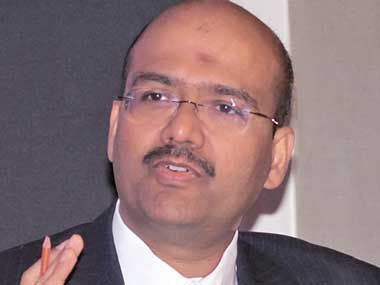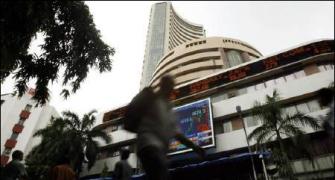 The Reserve Bank of India (RBI)'s decision to ease interest rates should now be backed by acceleration of reforms by the government, says R Venkataraman (pictured below), group managing director, IIFL. The Indian economy remains better than most but it is difficult to get decoupled from the rest of the world, he says in an interview to Samie Modak. Excerpts:
The Reserve Bank of India (RBI)'s decision to ease interest rates should now be backed by acceleration of reforms by the government, says R Venkataraman (pictured below), group managing director, IIFL. The Indian economy remains better than most but it is difficult to get decoupled from the rest of the world, he says in an interview to Samie Modak. Excerpts:
The market reaction to the surprise 50 basis points rate cut has been subdued. How significant is the rate cut from the equity market point of view?
The RBI's decision to go in on a sharper than expected rate cut is a big positive.
The stock market reaction has, however, been muted on account of global economic concerns.
We must understand that a rate cut is not a panacea for all the challenges the economy faces.
At the same time, the front-loading move by Raghuram Rajan has at least created a situation more favourable for economic growth.
RBI has set the bar high for a follow-on rate cut in December, by shifting the inflation target to five per cent by end-FY17.
Now, if the government can get its act together and make the most of this opportunity, a few quarters later, this rate-cut decision will be a game-changing moment.
The just-included quarter was the worst in nearly four years for emerging markets (EMs).
 Do you think concerns surrounding China or the health of the global economy will continue to weigh on the markets in the near future?
Do you think concerns surrounding China or the health of the global economy will continue to weigh on the markets in the near future?
Certainly. The fears of a China slowdown are warranted from global investors' point of view.
The weakness in commodity prices has resulted in risk-averse global investors pulling out money from EMs. Most of the EMs are linked to commodity prices or have linkages to the Chinese economy.
Hence, the equity markets of such economies will be affected. One can argue that India stands to benefit immensely from the fall in commodity prices as input costs of various industries will go down.
However, when a sell-off happens among EMs, it becomes very difficult for India to remain resilient or get decoupled.
We believe the selling is less to do with fundamentals and more to do with the flows.
India is termed as a bright spot among global markets. Do you think India can withstand the global turmoil?
India can indeed withstand global turmoil to some extent and emerge not just as the fastest growing nation but also the most attractive investment destination.
We are a large consumption economy and any fall in commodity prices will work to our advantage for a prolonged period.
Even the International Monetary Fund, a couple of days ago, reiterated that India remains a bright spot, even as it raised concerns about global economic growth.
The inherent strength of the Indian economy remains better than most peers. As and when the recovery takes place, the Indian equity market will stand to benefit immensely.
What more steps are needed by the government for India to remain insulated from the global turmoil and attract foreign investor flows?
The government will have to accelerate its reforms process with regards to infrastructure, manufacturing and domestic taxes.
While there is some progress on stalled projects, the task is a long way from being complete.
The government has stepped up public investment in infrastructure and in sectors like roads, power, railways and defence.
While important Bills are getting delayed due to political differences, many reforms have taken place and more measures can be effected outside the parliamentary process.
The government should articulate a stable long-term policy which will bring comfort and stability to further attract long-term foreign investors.
How do you see the September quarter corporate earnings pan out?
The September quarter is unlikely to be good.
The earnings of course are in the process of bottoming out but I do not expect anything miraculous to happen in the September quarter numbers.
Pain is continuing and investors are more or less reconciled to the fact that nothing can be expected in a hurry.
It will take another few quarters to confirm that the worst is behind us.
Domestic investors have been a dominant force this year. Do you think retail will continue to keep faith in equities despite the increase in volatility?
The big positive is that retail investors are investing through the mutual fund route.
It is indeed heartening to note that the domestic investors have managed very well to minimise the impact caused by relentless selling by foreign portfolio investors.
Retail holding in the equity market remains at a historical low and the situation can only get better from here onwards.










